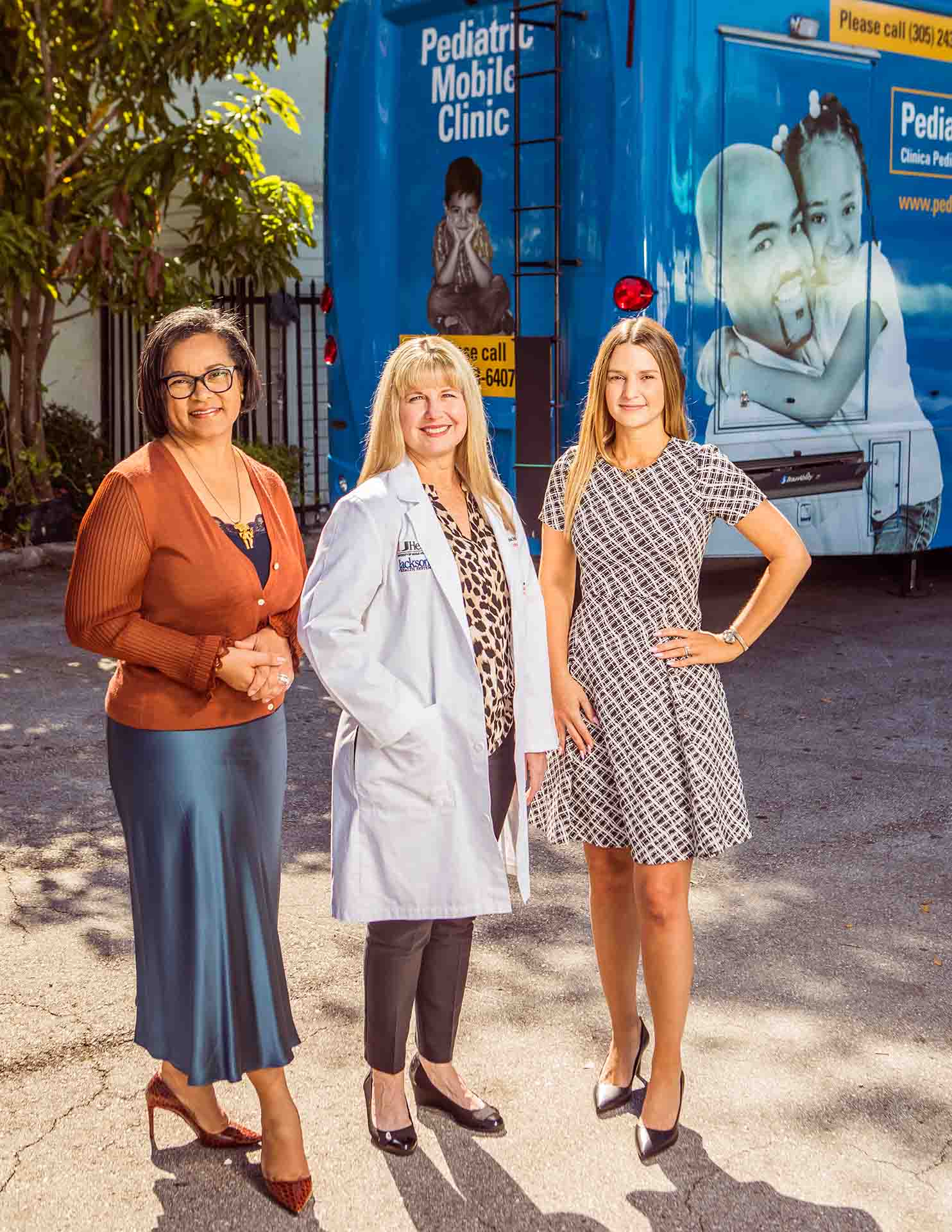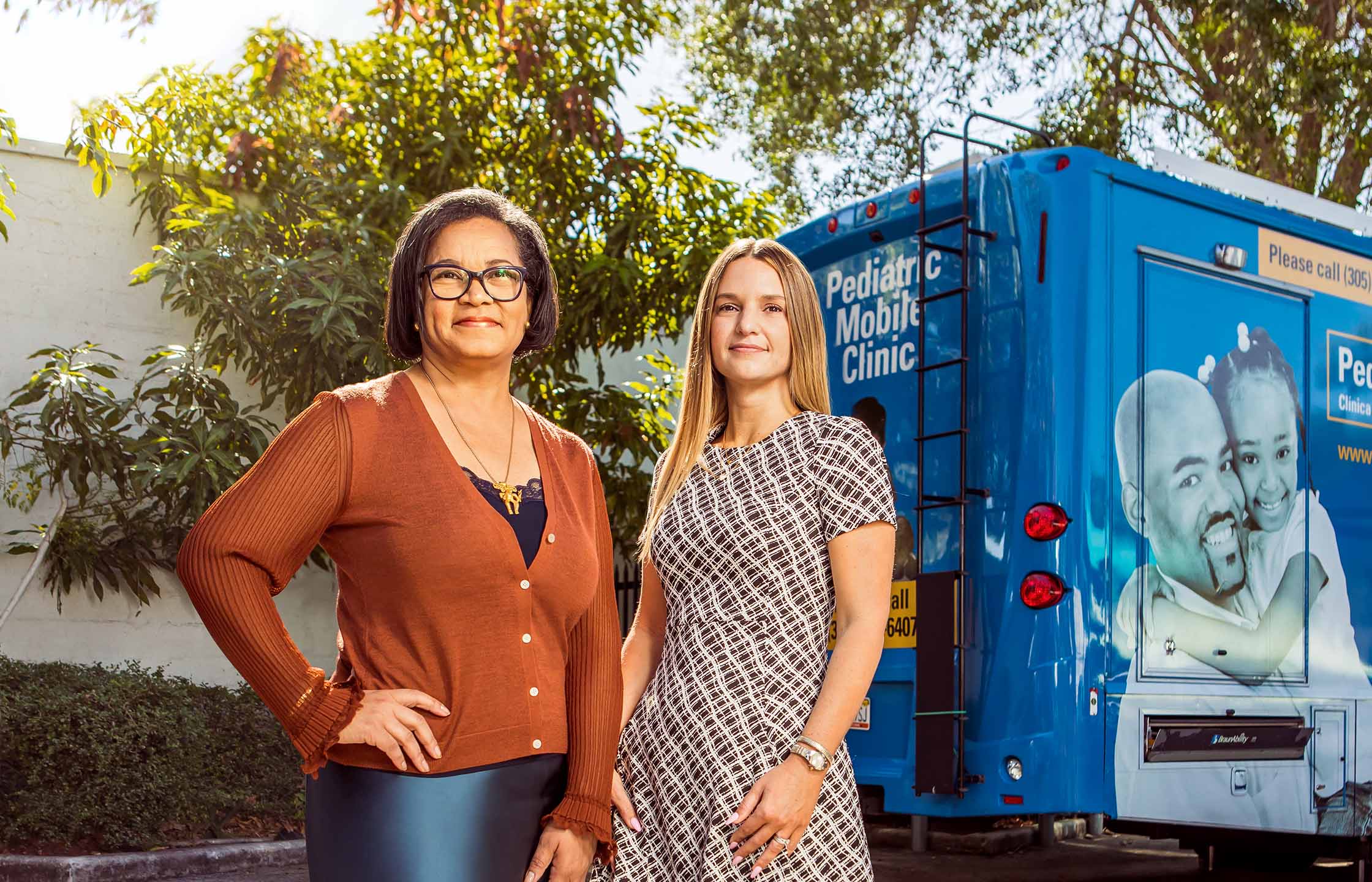Driving Health Equity
A grant from Bank of America will help fuel pediatric mobile clinics
By Stacey Bomser
Photograph by Sonya Revell

Vania Laguerre (left) and Christine Scott (right) of Bank of America, with Lisa Gwynn, D.O. The bank recently provided a grant to UM’s Pediatric Mobile Clinic to improve health equity
P
arents living in Miami-Dade County’s underserved communities have an ally when it comes to getting care for their children: The University of Miami’s Pediatric Mobile Clinic (PMC) is a fully equipped pediatric office on wheels, staffed by UHealth’s mobile clinic team. Currently, the mobile clinic — with two vehicles — provides care to about 3,000 children each year. The PMC program was established following Hurricane Andrew, but the COVID-19 pandemic shined the spotlight on its importance, particularly when it comes to combating health inequities.
Recently, Bank of America awarded $200,000 to the PMC. The gift is part of the bank’s $1.25 billion commitment over five years to advance racial equality and economic opportunities in the United States. The award comes at the perfect time, as PMC is getting ready to roll out a third vehicle, allowing it to expand its reach.
“There is no doubt that health equity is a societal challenge that warrants resources be allocated,” said Vania Laguerre, Bank of America’s local market executive for Miami. “As an institution, we have a role to play in helping our communities move forward. Given the impact of the pandemic on health care, particularly in communities of color, we felt this award was an opportunity to really inject support and have a tangible impact.”
“We’re thrilled Bank of America has put its faith in us and provided such generous support to continue our work,” said Lisa Gwynn, D.O., medical director of the PMC and associate professor of pediatrics at the Miller School. “This is a beautiful example of a community partnership. Together, we are committed to reducing health disparity and providing the necessary care to ensure all children meet their full potential.”
For more, visit everbrighter.miami.edu/PediatricMobileClinic
Access for All
UHealth and the Miller School are reducing health disparities to improve the health of our communities.
T
he coronavirus pandemic underscored our nation’s glaring disparities in health care, especially among low-income communities and people of color. At UHealth and the Miller School, addressing and reducing these inequities is a major part of our mission. Our health teams are committed to treating patients respectfully across different cultures and ethnicities, providing exceptional care to all, and enabling our medical students to gain training by serving much more heterogeneous demographics than they would encounter at other schools.
“As home to one of the most diverse populations in the nation, South Florida provides a unique window into the future of U.S. health care,” said Erin Kobetz, Ph.D., M.P.H., associate director of population sciences and cancer disparity at Sylvester Comprehensive Cancer Center, the John K. and Judy H. Schulte Senior Endowed Chair in Cancer Research, and vice provost for research and scholarship at the University of Miami. “The work we do here furthers our mission to improve health equity and enable everyone we treat to live longer, healthier and happier lives.”
Our community programs provide hundreds of thousands of South Florida residents with access to comprehensive care and services that align with their evolving needs. The Ever Brighter Campaign will advance our mission by strengthening community programs that include the University of Miami Precision Medicine Initiative (U-PROMISE), a new initiative that will enable our physicians to tailor therapies to reflect the genomic and environmental factors specific to individual patients.
Contributions will also go toward the formation of the UM Well-Being Institute (U-WIN), a global center of excellence that will set the pace for the study, development, and practice of well-being. Finally, campaign funds will assist in the expansion of research and treatment programs focused on addiction, HIV, cancer, diabetes and other illnesses that threaten our communities. ![]()



